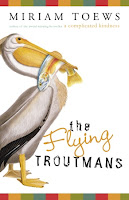 I stayed in bed far too late this morning finishing Curtis Sittenfeld‘s American Wife. As it’s no secret, the novel fictionalizes the life of an American First Lady, and is loosely based on the life of Laura Bush. Alice Lindgren grows up in a small town in Wisconsin, goes to high school, college, and then settles down for a quiet life as a librarian of a primary school. She meets Charlie Blackwell, a happy-go-lucky sort of fellow at a party, and he pursues her somewhat recklessly. As boisterous as she is quiet, Charlie and Alice make an unlikely couple, but they fall into a traditional kind of love, marry, and have a daughter, Ella. Coming from a political family, Charlie (as one can guess) becomes president and Alice’s life takes a turn she never asked for nor expected.
I stayed in bed far too late this morning finishing Curtis Sittenfeld‘s American Wife. As it’s no secret, the novel fictionalizes the life of an American First Lady, and is loosely based on the life of Laura Bush. Alice Lindgren grows up in a small town in Wisconsin, goes to high school, college, and then settles down for a quiet life as a librarian of a primary school. She meets Charlie Blackwell, a happy-go-lucky sort of fellow at a party, and he pursues her somewhat recklessly. As boisterous as she is quiet, Charlie and Alice make an unlikely couple, but they fall into a traditional kind of love, marry, and have a daughter, Ella. Coming from a political family, Charlie (as one can guess) becomes president and Alice’s life takes a turn she never asked for nor expected.
Yet, the politics are not even the point of Curtis Sittenfeld’s utterly captivating novel. At it’s heart, I think American Wife is the story of a life. The novel creates a rich, deeply felt, deeply thought examination of the human experience as it grows from childhood into adulthood as told from the point of view of one remarkable woman. Throughout the novel, the irony of her position is never lost on Alice, and it’s as if Sittenfeld imagines a woman holding her tongue for decades just waiting for the right moment to let everything out. Alice has always been a reader; it’s the quality that most defines her, as does her dignity, her intelligence and her (sometimes) naiveté. The book is epic in its scope of Alice’s story; it leaves no part unexplored, and the subject is at once freeing as it is limiting.
When Alice is a teenager, experiencing if not the first blush of true love than something definitely close to it, a tragedy happens that takes hold and defines her life, as many unexpected events tend to do. The events around the tragedy snowball and dig further into her psyche. She makes mistakes. And then she makes more mistakes. But they are the events that lead her to Charlie in the first place and it’s a happy life, overall. That’s not to say that there isn’t a questioning that runs through the course of the events. Alice questions everything: her good fortune, her own politics (she’s a Democrat; Charlie’s a Republican), her marriage, and her own values. That’s not to say that she ever stops loving her husband. There’s simply a recognition that after decades of marriage the nature of a relationship changes, evolves, and then sometimes reverts to its previous incarnations.
I can’t pretend to dislike anything about the book. The structure works (each major section follows Alice’s addresses, from her childhood home to 1600 Pennsylvania Avenue) and the character is so fully realized that it’s almost refreshing to read. If I had to make one comment (because no reviewer can fail to make one critical note), it’s that the dialogue at times felt stilted and forced, but when you’re attacking an idea that’s so honest and, well, original, one can fault the author for falling down ever-so-slightly when it comes to the banality of everyday conversations. Regardless, the book is its strongest at the beginning and at the end, and there’s a particularly poignant section about the impact of fame upon someone who has never once in their life craved to be famous.
American Wife is a fascinating book, one that cements Sittenfeld’s already firm place as one of the most refreshing talents working today. I had the pleasure of having lunch with her a few years ago while I was working at Random House, and it doesn’t mean that I know her nor even pretend to do so, but the one piece of writing advice she gave that day has stuck with me for the last three years: “If one sentence can be that good, all of the sentences can be that good.” Sittenfeld admits that it’s not even her advice to give, that it came from a professor she had while she was in Iowa, but in the end it doesn’t matter because it’s glaringly apparent that she’s mastered many, many sentences, and I’m more than willing to read every single one.








